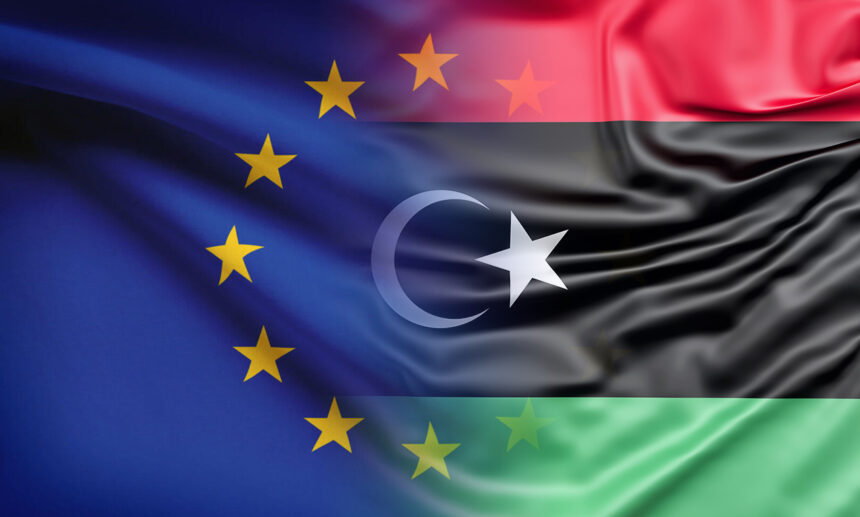The article titled “Libya and the EU: Key Interests, Critical Issues, and Future Prospects” from ISPI (Italian Institute for International Political Studies) explores the complex relationship between Libya and the European Union (EU). Here’s a summary of the key points:
- Key Interests:
- Migration: One of the EU’s primary concerns is managing migration flows from Libya, which is a significant transit point for migrants trying to reach Europe.
- Security: The EU is interested in stabilizing Libya to prevent the spillover of conflict and terrorism into the Mediterranean region.
- Energy: Libya’s oil and gas resources are of strategic interest to the EU for energy security and economic reasons.
- Critical Issues:
- Political Instability: Libya has been plagued by political fragmentation and conflict since the fall of Gaddafi, complicating efforts to establish a stable government.
- Human Rights: The EU faces challenges in addressing human rights abuses in Libya, including issues related to migrant detention centers and internal conflicts.
- Regional Rivalries: The involvement of various regional actors with competing interests in Libya complicates the EU’s efforts to mediate and stabilize the situation.
- Future Prospects:
- EU Engagement: The EU’s future role may involve a combination of diplomatic efforts, support for peacebuilding initiatives, and cooperation on migration management.
- Regional Cooperation: Strengthening partnerships with neighboring countries and regional organizations could be crucial for effective intervention and stabilization efforts.
- Long-Term Solutions: Sustainable progress in Libya will likely require addressing the underlying political, economic, and social issues that contribute to instability.
It provides a comprehensive overview of the strategic interests of the EU in Libya, the challenges it faces, and potential pathways for future engagement and resolution. Read more below.
Libya and Europe are deeply entwined, although neither would really like to admit just how much. For the European Union, and key member states like France, Libya stands as its major Arab Spring intervention, and a perennial foreign policy crisis ever since. Despite numerous high-profile initiatives and UN envoys coming from Europe, Libya still induces regular waves of anxiety in the EU, raising concerns over key issues like migration or Russian roguery and making the country a rotting symbol of European diplomatic failure.
For Libya, Europe represents an, often idealised, ambition. Libya’s undemocratic leaderships hope that European desperation for a familiar, reliable, partner, and the European proclivity to pursue strongman solutions for southern neighbourhood problems, will provide them the foreign legitimacy they desperately crave to maintain power. Libya’s people, however, hope the EU will become an enforcer of their much-vaunted rules-based-order and in doing so help Libya transition to the representative market economy they desire. So, this mutually unsatisfying Euro-Libyan relationship retains the promise for considerable growth and improvement, if either side can figure out just how to advance their interests amongst their counterparts.
What’s Europe to Libya
In today’s deeply broken Libya, nothing is cohesive, including its international relations. So, understanding Libya’s interests, critical issues, and their prospects requires unpacking the different perspectives of different constituencies.
Although Libya may be administratively divided between east and west, its real divide is between the ruling class and the rest. The rabble of weak strongmen, undemocratic parliaments, and illegitimate prime ministers comprising the ruling class are all desperate actors, constantly fiending for foreign support to compensate for their illegitimacy amongst their people. In a land that hasn’t held elections since 2014, and that hasn’t had any sign of meaningful governance for over a decade, these leaders justify their political authority through their foreign engagements, and their lack of progress through domestic divisions that are more theatrical than actual.
So, each actor essentially seeks the same thing from the EU, legitimisation, just in different flavours.
Prime Minister Abdul-Hamid Dbeiba, installed via a 2021 UN process supposed to lead to elections within 10 months, seeks to normalise his indefinite stay and broaden his mandate. He does so by blaming electoral failures on his political rivals, while baiting Europeans with lucrative promises of construction contracts and new energy deals. Although the financial input needed to lubricate his corrupt political machine is already sustained by other international players, Western countries retain a unique legitimising capability. So, this subprime Prime Minister also promises counter-migration cooperation, and leverages the spectre of Russian interference for ever greater backing for his government, and an ever blinder eye to the corruption, political crimes, and human rights abuses he presides over.
Dbeiba’s political rival, the speaker of Libya’s House of Representatives Aguileh Saleh, similarly craves the magic of Europe’s blessings to carry his parliament’s legitimacy, but also, to empower his political machinations. Namely, approval over self-appointed powers to essentially appoint new Prime Ministers, and draft Libya’s election laws to his benefit. He already enjoys Egyptian support for this, enhancing its appeal as an expedient solution to European capitals.
Meanwhile, Khalifa Haftar, Libya’s aspiring next top dictator continues courting European attention to: legitimise his authoritarian rule that divides Libya; retain his impunity for an impressively broad and often horrific list of crimes; help him gain greater access to Libya’s state finances; channel legitimising finance to his Potemkin reconstruction project in Derna; and help him grow his power in western Libya. To this end, he brands himself as a necessary evil: the only one who can provide stability and security in an otherwise chaotic environment. Recently courting Europeans as a counter-migration partner, despite his son Saddam being key to trafficking networks. Similarly, paradoxically, he is trying to leverage his military reliance on Russia and Russia’s entrenchment across areas he nominally controls, to goad the US and EU into replacing Moscow.
Amidst this morass of petty political scheming sit the Libyan people, hoping Europeans will fulfil their promises to shepherd Libya’s transition. But, after years of failure Libyans have become nihilistic. While they may no longer believe that the EU wants to or can help them achieve political change, Libyans largely wish that Europeans would just show support whenever they risked their lives protesting. Or that Europeans would do something to push back against the worsening authoritarianism, political arrests, torture and murder in-between photo-ops with their Libyan partners responsible for this decline.
What’s Libya to Europe
Libya is undoubtedly less important to Europe, than Europe is to Libya, but, concerningly for all, it’s also far less important than it should be for Europe. Throughout their lengthy involvement in Libya’s transition, the EU and its member states have often suffered from prioritising the tactical over the strategic. Today, beset by crises from Ukraine to Gaza, Libya is deprioritised to ever greater depths.
Like the Libyans, Europeans are deeply divided over their interests and policy. While Paris and Rome remain the notorious face of European rivalries over Libya, they are not the only member-states involved. And each is suspicious that others will obstruct their political relationship building, or their ability to gather Libyan energy and other lucrative contracts.
The EU and its member-states have, however, maintained fairly stable, dominant priorities in Libya. Foremost is irregular migration. Here the EU and its member states try to stop migrant departures via broad engagements with Libya’s coastguard and interior ministry, despite their dubious credibility as partners; and informal deals with the Haftars that are just as shocking, and ineffective. More recently is removing (or at least dampening) the influence of rival actors (namely Turkey and Russia). This became inflamed in 2019 as Turkey used Libya to legitimise its energy ambitions in the eastern Mediterranean, to the fury of Greece and Cyprus. Nowadays, Russia’s malicious presence a few hundred kilometres from Sicily and Libya’s centrality to Russian expansion in Africa and the Mediterranean is a quickly growing concern for European States.
Behind these imperatives, lay more general goals. Like stabilising Libyan politics, or at least containing Libya’s penchant for destabilising others. Or returning Libya to being a reliable energy provider, especially given recent needs to pivot from Russian dependencies. Given the importance of political stability as a functional prerequisite to other pursuits, supporting a political process remains the EU’s highest priority. Even if the member-states do not always share that priority, leading to potentially invaluable tools like operation Irini being almost completely defanged.
Libya and Europe need each other. But, after years of divided actors myopically pursuing self-serving goals, they are drifting apart. For Libyan leaders, Europe is a target to be tamed by migration, while for Europeans Libya’s difficulties are outweighing any potential benefits. As Libyan aspirations and European interests gradually die out, other states are benefitting. With little prospects that these other actors can bring peace, this only means that Europe is surrendering lingering influence over Libya, while remaining vulnerable to the crises Libya will continue exporting across the Mediterranean.
By: Tarek Megerisi
Source: ISPI







